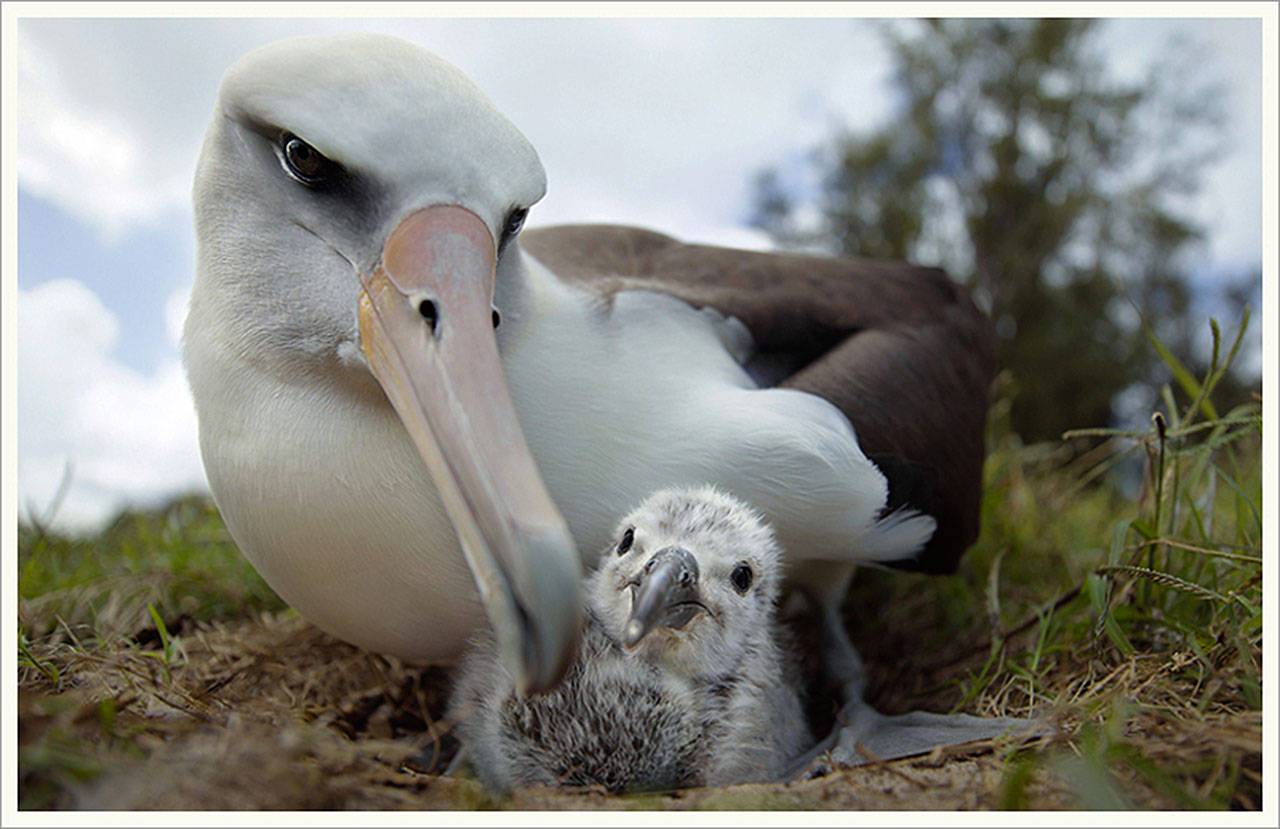The photos are devastating, the film heartbreaking and the message disturbing — mass consumption is killing us and everything in our wake.
Chris Jordan, a former Seattle corporate lawyer turned artist and photographer, spent eight years filming the plight of albatross birds on isolated Midway Island in the middle of the Pacific Ocean. Located 2,000 miles from the nearest continent, the birds are dying by the thousands as a result of plastic pollution endlessly swirling in our oceans.
While the slow-paced documentary film “Albatross” may look like another polemic on plastic — albeit a poetic one — its creator wants viewers to look beyond the rows of dead birds in the sand and peer into their own homes and lives.
“The way I see it, ocean plastic is not the problem,” Jordan said. “It is a symptom of a much deeper problem that resides in the morphic field of collective consciousness.”
“That problem is what ‘Albatross’ is aimed at — reconnecting with empathy and compassion and the love we are all made of.”
Next month, Jordan will give the Trudy J. Sundberg Lecture, an annual presentation honoring the memory of Trudy Sundberg, an Oak Harbor teacher and community leader.
Sundberg, who died in 2013, was known for her commitment to many causes, such as land conservation, arts and progressive politics.
Family members, friends and the Sno-Isle Libraries Foundation joined together to establish the Trudy Sundberg Memorial Fund and the lecture series began in 2016.
Jordan’s film has been showing around Whidbey Island libraries as a precursor to his May 3 and May 4 appearances.
A final full-screen showing is scheduled at 2 p.m., Sunday, April 21 at the Clyde Theatre in Langley.
That screening is also part of a month-long series of Whidbey Earth & Ocean Month events presented by a coalition of organizations.
Jordan released the film on Earth Day 2018. He offers it free to groups interested in hosting discussions around it.
Organizations, schools and other groups around the world have shown it and offer comments on an online forum. He has produced numerous photographic series about garbage and mass consumption — warehouses of discarded cellphones in Atlanta, piles of crushed cars in Tacoma, ship containers in Seattle.
Jordan first visited Midway in September 2009, when the albatrosses were far out to sea but on land he found tens of thousands of dead chicks.
Parents of albatross chicks unknowingly feed their young bottle caps, printer cartridges, toothpick containers, cigarette lighters and other plastic bits they’ve picked up while skimming the ocean’s surface with their big beaks looking for squid and other food.
While adult albatross can regurgitate plastic they’ve swallowed, their chicks cannot. So like the oceans, their bellies fill and swell with plastic.
Jordan has also experienced the majesty and mystery of the Laysan albatross (Phoebastria immutabilis) on Midway, one of the largest colonies for the largest seabird in the North Pacific. With a six-foot wing span, albatross can go for years without touching land.
The birds mate for life, engage in elaborate courtship dances and are believed to live more than half a century.
A female albatross named Wisdom was banded by a U.S. Geological Survey researcher in 1956 and has been seen in recent years still rearing chicks.
Although Jordan’s film takes viewers on a distressful tour of bird carcasses that decompose into miniature heaps of indestructible garbage, he insists “Albatross” is more about the human heart than about plastic parts.
“For me the project was about connecting with the living world on a much deeper level, experiencing beauty and grief and finding my way to a new relationship with life,” Jordan wrote in an email from Utah, where he’s embarking on an extended sojourn photographing in the desert.
“I really don’t think of ‘Albatross’ as being about activism around ocean plastic,” he wrote.
“Of course it covers that topic, but that is the thing I am least interested in talking about in connection with the film. I think of ‘Albatross’ as an artwork, not a piece of environmental activism.”
Whidbey Earth and Ocean events:
• Chris Jordan’s documentary film “Albatross” will be shown 2 p.m., Sunday, April 21 at the Clyde Theatre, Langley. Free.
• Chris Jordan appearances for Trudy Sundberg Lectures: 7 p.m., Friday, May 3 at Whidbey Center for the Arts, 565 Camano Ave., Langley and 7 p.m., Saturday, May 4 at Coupeville High School Performing Arts Center, 501 S. Main St., Coupeville. Presentations are free and open to the public
• For more information: www.albatrossthefilm.com, www.chrisjordan.com


